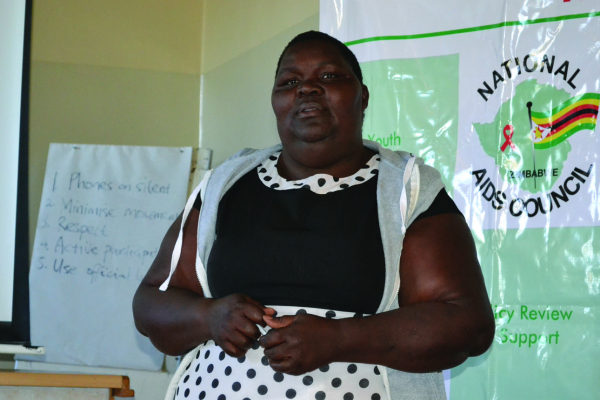
Disclosure of HIV status, according to WHO, is an integral part of the process of living with HIV, and is crucial to continuum of HIV care. But as 58-year-old Irene Musarapasi from Makonde district in Mashonaland West would discover, it is not without its drawbacks especially when children are involved coupled with a community which is judgmental and moralistic.
BY PHYLLIS MBANJE
Narrating her ordeal to health journalists in Chinhoyi recently, Musarapasi said she faced a mammoth task in disclosing her status to her children, family and community.
“What made it worse was the fact that during those years antiretroviral (ARVs) drugs were scarce and so being diagnosed was equal to being handed a death sentence,” she recalls.
Vibrant and quite chatty Musarapasi has walked a long road to be where she is today. She has no qualms about disclosing her status to strangers.
But exactly 22 years ago, she was at her wit’s end. Six months pregnant with her fourth baby, she discovered that her ailing husband was HIV positive.
“My husband had been sick for a long time. We consulted witch doctors, faith healers but he did not get any better,” her face clouds with emotion as she narrates the dark moments.
Her husband lost the fight to HIV and died in 1996.
- Chamisa under fire over US$120K donation
- Mavhunga puts DeMbare into Chibuku quarterfinals
- Pension funds bet on Cabora Bassa oilfields
- Councils defy govt fire tender directive
Keep Reading
“I was six months pregnant when he died. It was a very difficult moment for me. There was no Nevaripine for expecting mothers,” said Musarapasi.
In the 1990s a lot of HIV-positive women did not have access to Prevention of Mother to Child Treatment (PMTCT) which largely prevents the babies from being infected.
Miraculously her baby was not infected, “I was still in good health at the time and so my baby was spared the disease,”
Unable to access medication and also partly in denial, she chose alternative therapy instead.
“Until 2006 I was only using herbs but my health started to deteriorate. When my CD4 count was taken it was only 170,” she said.
A CD4 count measures the number of white blood cells that play a major role in protecting the body from infection while the viral load testing, measures HIV levels in the blood. So a lower CD4 was one of the red flags that signalled the initiation of treatment.
However, following WHO new guidelines anyone who is tested and found to be HIV positive, they should be initiated on treatment regardless of their CD4 count.
The director of AIDS and TB Owen Mugurungi said in line with these new recommendations Zimbabwe has also adopted this new treatment regime, but more funding is needed to ensure the ARVs are always available for those who require them.
Disclosure….
Musarapasi was screened for tuberculosis (TB) before being initiated on ARVs. Through Batsirai group a community initiative based in Chinhoyi, she was referred to a hospital after being diagnosed with TB of the lungs.
“I was experiencing shortness of breath and could not walk without holding on to something for balance,” she said.
Going to the bathroom was an uphill task and she dreaded the moment but endured the treatment for six months until it was done.
She also had to contend with the severe side effects of ARVs.
“I could not sleep at night and assumed the witches were causing it,”
However, through treatment literacy she learned that it was critical to stay on first line of treatment no matter the cost.
“Then I was faced with the difficult decision to disclose to my children and everybody else. It was not an easy choice, but I knew that their support was more important than being ashamed or afraid,” she said.
Slowly and gradually Musarapasi started explaining to her children until they comprehended what their mother was grappling with everyday.
“It broke my heart to see their sad and scared faces but they rallied around me.
It was quite comforting actually not to hide my medication or explain it,”she said.
“They monitored me and made sure I took my meds religiously. I once went to another village for a couple of days and my kids did not know that I had taken enough drugs for the few days and followed me with the whole bottles,” she recalled.
Musarapasi is an active member of support groups in her community and continues to share about her status.
“Disclosing my status is a way of encouraging others to also come out and demystify the disease. It also helps with issues of stigma and discrimination when we talk about it openly,”
She challenged the members of the fourth estate to also come out and talk about their status as well.
“I challenge you (journalists) to also come out in the open about HIV and Aids. This is the only way we can beat this disease for good,” she said.
The Nati–onal Aids Council (Nac) chief executive officer Tapuwa Magure said over 1,1 million people were on ART against 1,4 million people estimated to be living with HIV.
“We push on with health ministry mantra of closing the taps on new infections,” he said.











